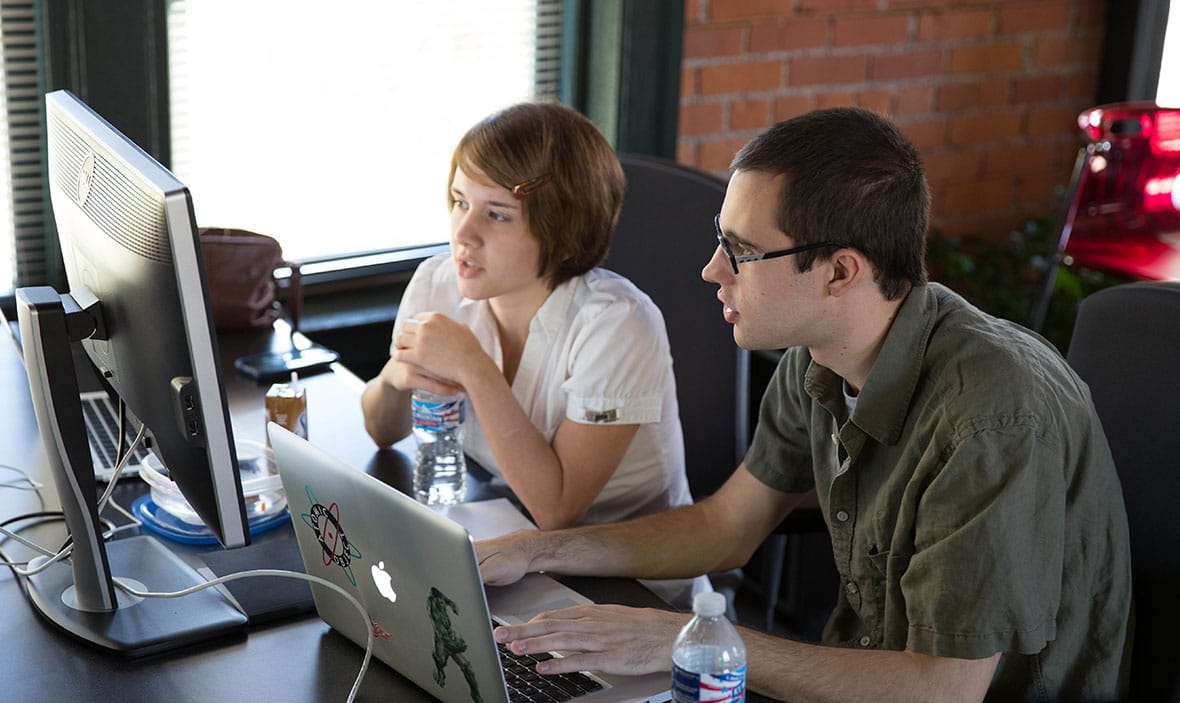Atomic’s five values are central to every policy we create and every decision we make—and I don’t just mean management-level decisions. The last time we considered adding a new value, it started a 100-message-long email thread discussing what “transparency” meant and trying to get the wording just right. In other words, our values really matter to all of us.
But don’t just take my word for it. I’m a Marketing Coordinator, and it’s my job to help Atomic put its best face forward. To give you a broader perspective, I surveyed all of Atomic Object. Here’s how Atoms answered the question: “What does Own It mean to you?”
This is the first post in a series on Atomic’s values, described by the Atoms themselves.
1. Blurring the Line between “Client” and “Consultant”
A very common theme was the idea that Atoms consider themselves a part of the client team, and they make the client’s problems their problems, the clients’ goals their goals.
When you “own it,” you treat the client’s project as if it was your own — your money on the line, your name on the line, your job on the line.
– Patrick Bacon
To me it means taking responsibility for the overall health of the project. It means working for the greatest outcome for the product and customer, not just checking off boxes trying to get “your” tasks complete.
– Will Pleasant-Ryan
So instead of simply designing interfaces and writing code, Atoms look for the smartest, most efficient way to solve the client’s problem.
It means internalizing our customers’ business goals, then prioritizing and structuring work to maximize success. This makes each project a constant game of technical, project management, and design Tetris, arranging and aligning the pieces over time so that they can all come together to clear large swaths of business need at once. It means playing the long game and looking for ways to save our customers tens of thousands of dollars with engineering wins — even though that money would have otherwise gone to Atomic.
– Drew Colthorp
Ideally, there is no “our team” and “their team” because no matter where we sit, we all have the same goal — creating a product that does the client the most good for their budget.

2. See it, Do it
Proactivity and personal responsibility also came up a lot. Atoms don’t wait to be told what to do; we step up without being asked. We see opportunities and seize them.
If you perceive you can add value (or that someone needs to step up to take responsibility), you try to take on responsibilities that you haven’t explicitly been entrusted with.
– Justin Kulesza
Don’t assume someone else will get something done. It’s always up to you.
– Micah Alles
Take responsibility for getting things done when they need done. Take responsibility for delivering value to the customer and making your project a success. Take responsibility for writing quality software and solving technical problems the right way. Take responsibility for your mistakes and make things right. Don’t wait for someone to tell you to do something, don’t leave it for someone else to take care of, and don’t pass the buck for it.
– John Croisant
People also talked about taking the initiative to improve their craft, their industry, and themselves.
Atoms learn without prescribed direction. They shape their environments to be effective for them. They take responsibility for their own behaviors.
– Eric Shull
Taking personal responsibility for being good at their work, by self-identifying ways to learn more and get better in their work.Taking personal responsibility for their personal behavior. Make right any bad situation they may have contributed to or decisions that may not have worked out well.
– Mary O’Neill
Atoms “Own It” when they contribute to open source projects, support a new technology, contribute to the software development community.
– Anne Marsan

3. No Such Thing as “Not My Job”
Atomic Object isn’t a place where we work. It’s a thing we’re a part of — a complicated, constantly-evolving, sometimes-messy… organism, I guess. And all Atoms have the power and the responsibility to keep it living and growing.
It means working for the good of the company in ways that aren’t in your “job description.” This can be as small as emptying the dishwasher or as big as helping someone out with a complicated project management issue on their project.
– Will Pleasant-Ryan
It could mean taking some time to update pages in the wiki, enhancing internal tools, fixing bugs in internal tools, organizing the library, learning more about how the company operates and attending Board meetings, etc. ‘Own it’ means you aren’t told that you need to do these kinds of things. You notice a need and you step up.
– Patrick Bacon
Take out the trash. Greet visitors at the top of the stairs. Create a monthly user group. Drive to Detroit in the middle of the night to help with a meeting in the morning. Raise tough issues on workplace safety to the entire company. Speak truth to power; challenge the boss.
– Dave Crosby
“Own It” in Six Words
I also asked everyone to summarize “Own It” in just six words. These are my favorite answers.
- Show up. Take initiative. Follow through. – Jenny Carroll
- When you see an opportunity, act. – Brittany Hunter
- Figure it out. Get it done. – David Crosby
- Personal responsibility in all we do – Karlin Fox
- Needs are filled; buck stops here. – Jason Porritt
This is the first post in a series on Atomic’s values, described by the Atoms themselves.


It’s hard enough for a company to be genuinely introspective. It’s very cool that you guys are so public about it.
Looking forward to seeing the rest of the principles fleshed out.